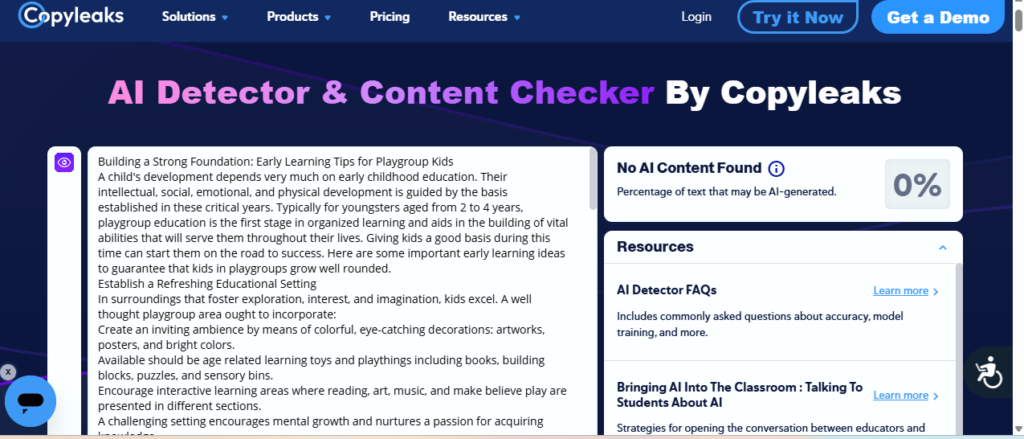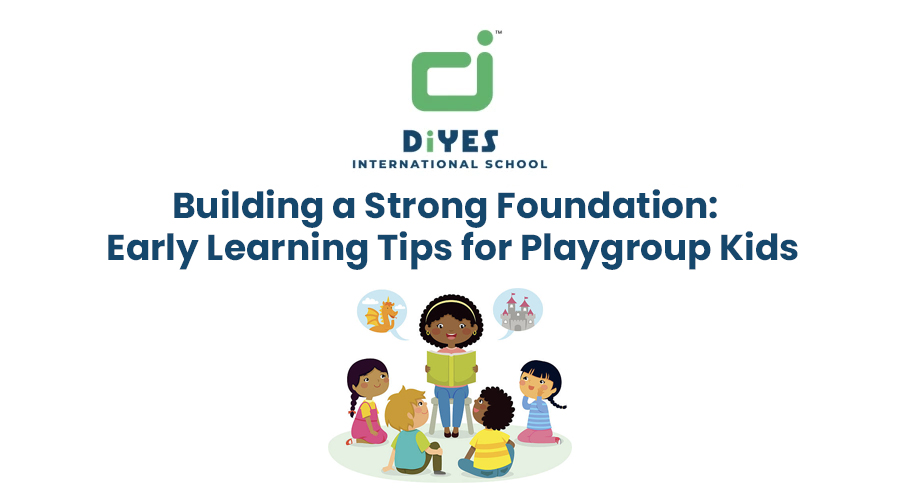A child’s development depends very much on early childhood education. Their intellectual, social, emotional, and physical development is guided by the basis established in these critical years. Typically for youngsters aged from 2 to 4 years, playgroup education is the first stage in organized learning and aids in the building of vital abilities that will serve them throughout their lives.
At DiYES International we do just that and better. Giving kids a good basis during this time can start them on the road to success. Here are some important early learning ideas to guarantee that kids in playgroups grow well rounded.
Establish a Refreshing Educational Setting
In surroundings that foster exploration, interest, and imagination, kids excel. A well thought playgroup area ought to incorporate:
- Create an inviting ambience by means of colorful, eye-catching decorations: artworks, posters, and bright colors.
- Available should be age related learning toys and playthings including books, building blocks, puzzles, and sensory bins.
- Encourage interactive learning areas where reading, art, music, and make believe play are presented in different sections.
- A challenging setting that will encourage mental growth and nurtures a passion for acquiring knowledge.
Promote Learning Through Play
For youngsters, play is the most important means of acquiring knowledge. It lets them grow creativity, social learning, and problem solving abilities. Some good play based learning techniques would be:
- Imaginative and social abilities improve when children engage in pretend play, such as house, doctor, or shopkeeper play.
- Outdoor play helps youngsters to develop coordination and motor skills by means of such things as running, wall climbing, and sand play.
- Singing songs, dancing, and playing musical instruments support auditory and motor development.
- Including play into daily activities helps kids to acquire social and intellectual abilities naturally.
Pay Attention to Language Acquisition
Early learning depends very much on language. Kids pick up language abilities from their environment, so parents and teachers need to foster verbal communication. Improving language acquisition involves:
- Reading stories aloud: Doing this enhances knowledge and understanding of words.
- Encourage kids to share their opinions and emotions, engaging in open debates.
- Singing nurseries helps with memory and phonemic perception.
- Using descriptive words, describe objects, actions, and emotions to assist youngsters in developing a broad vocabulary.
- Literacy and good communication lay on a base of plenty of language exposure.
Encourage the development of social and emotional skills
Social and emotional qualities let children develop empathy, control emotions, and form relationships. To back this development:
- Teach cooperation and sharing by inspiring group projects and turn taking.
- Model good behaviour: Kids copy grownups, so show respect, patience, and love.
- Support emotional expression: Teach youngsters to identify and label their feelings.
- Nurturing surroundings enable children to freely express themselves.
- Early development of these abilities assists kids negotiate social situations and construct good relationships.
Present Fundamental Ideas in Science and Math
Even from a little age, kids could understand the basics of math and science via practical exercises. Some good approaches consist in:
- Counting activities help introduce numbers by going over objects, steps, or toys.
- Grouping things by color, shape, or size helps to develop organizing abilities.
- Mixing colors or growing plants encourage curiosity and scientific thinking. Simple experiments:
- Block building helps children to learn spatial understanding and problem solving.
- Fun with mathematics and science inspires kids to search and discover.
Improve Your Gross and Fine Motor Skills
For independence and physical growth, motor skills are fundamental. Improving these qualities:
- Playing with clay, threading beads, coloring, and drawing engage fine motor skills, thereby improving eye hand coordination.
- Balancing, climbing, jumping, and running all help to fortify core and coordination.
- Sensory play helps develop tactile sensitivity by means of activities using sand, water, and rice.
- Good motor skills enable children to eat, dress, and write; engage with daily activities.
Promote Self-reliance and judgment
Independent teaching in kids increases their problem solving skills and self assuredness. Stimulating independent action by:
- Let kids dress themselves, clean up toys, and clean their hands; there is independence.
- Offering choices: Offer obvious choices such as book reading or snack selection.
- Encourage problem solving: Show kids how to discover answers instead of just offering instant assistance.
- Children that believe they are competent have a feeling of self reliance and responsibility.
Encourage imagination and creativity
Cognitive growth depends on creative thinking as much as on self expression. Develop creativity by nature:
- Give open ended supplies: paints, building blocks, playdough, crayons.
- Inspire storytelling: allow kids to invent their own stories and act them out.
- Answer their inquiries and motivate them to investigate fresh ideas to support their natural business.
- Creativity aids kids in thinking outside the box and honing problem solving abilities.
Create Consistency and Routines
For little kids, daily schedules give some order and assurance. Daily regular activities should comprise:
- Scheduled snack and food intervals
- Specific times set aside for playing and learning
- naps and breaks
- methods of going to bed
- Children feel secure and know what is expected of them if a routine is followed.
- Routines provide a sense of security and structure for young children
Engage Parents and Guardians
A young learning experience relies significantly on parental engagement. For reinforcing the connection between home and school:
- Share learning opportunities: give parents suggestions on athome study.
- Keep parents updated on their child’s achievements and progress.
- Encourage reading at home: Offer books for group reading that are suitable for their age.
- Sponsor parent child events: Engagement is encouraged by activities such crafts days or storytelling sessions.
- Active parents provide kids with regular learning opportunities both at home and in school.
Conclusion
Strong early childhood foundation paves the road for lifetime achievement and learning and at DiYES International you get exactly that.Holistic development among playgroup children can be achieved by means of a stimulating setting, play based learning encouragement, social and language skills development, introduction of fundamental academic ideas, and support of independence and creativity. By applying these ideas, we can guarantee that kids start their academic path with enthusiasm and confidence; caregivers, teachers, and parents play a very important part in forming a child’s early experiences.



